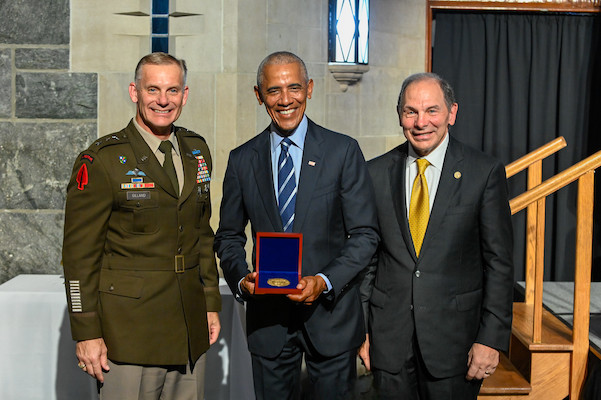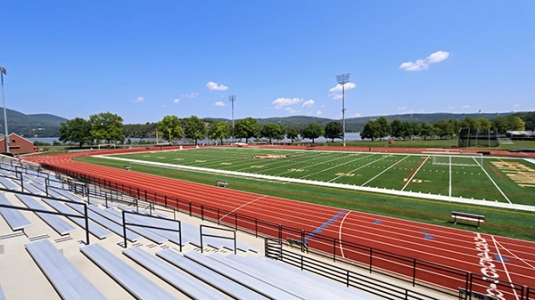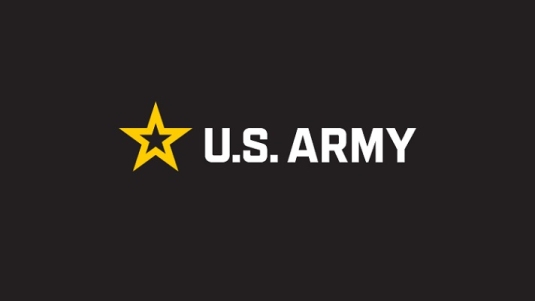By Erika Norton, WPAOG Senior Multimedia Journalist
Barack Obama, 44th President of the United States, received the 2024 Sylvanus Thayer Award from the West Point Association of Graduates. He is the fifth U.S. president to receive the Thayer Award, which is West Point’s highest honor given to a distinguished citizen whose service and accomplishments embody the ideals of the U.S. Military Academy’s motto, “Duty, Honor, Country.”
“Mr. President, I can say without hesitation that your name on the West Point Thayer Award plaque adds immeasurably to the six-decade assemblage of presidents, congressional leaders, legislators, Supreme Court justices, pastors, astronauts, business leaders, clergy members, scientists, journalists and entertainers who have received a Thayer award,” said WPAOG’s Board Chairman, the Honorable Robert A. McDonald ’75, when presenting Obama with the award on September 19.
McDonald, who served as Secretary of the Department of Veterans Affairs during Obama’s administration, said it was a privilege to witness firsthand not only the former president’s accomplishments in service to the nation, but the integrity, empathy, and compassion that he brought to every decision and interaction, including his accomplishments impacting the lives of veterans.
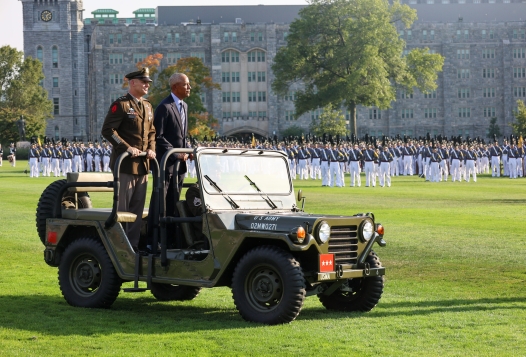
In keeping with tradition, Obama took time to engage with cadets, and the entire Corps conducted a review on the Plain to honor the 2024 Sylvanus Thayer Award recipient. Obama addressed the Corps in his acceptance speech.
“My powers may be more limited as a private citizen than they were when I was President and Commander-in-Chief, but the one thing I can still do is express my heartfelt gratitude to every cadet for your commitment to serve the American people,” Obama said. “At a time of so much division, you’ve chosen teamwork and unity. At a time of so much cynicism, you’ve chosen faith in the future. And at a time when so much of our culture steers us towards money and fame and distraction, you’ve embarked on a life of purpose —striving on behalf of something bigger than yourselves.”
When Obama left office on January 20, 2017, he left as the first American president to oversee two full terms as a commander-in-chief with combat troops deployed to hostile zones during a time of war. In his speech to the Corps, he emphasized the United States’ role as a world leader and encouraged the future Army officers that when a global event such as a conflict, pandemic, or natural disaster occurs, to not abandon the nation’s leadership role and give in to isolationism.
Addressing a room filled with cadets and veterans—including decorated West Point alumni, wounded warriors, and Gold Star families—Obama emphasized that while ensuring the nation’s safety is vital, war is inherently tragic, “leaving scars, seen and unseen, not only on the vanquished but also on the victors.”
“We have a responsibility to always give our troops a clear mission, the support they need to get the job done, and a plan for what comes after,” Obama said. “When the U.S. military gets involved in a conflict, we must do so with an honest assessment of the risks and tradeoffs. And when things don’t go according to plan, we need to admit our mistakes and reevaluate our strategies rather than just doubling down. That’s how we prevent the kind of mission creep that history teaches us to avoid. That’s how we keep our nation secure – and justify the trust that our troops deserve.”
While diplomacy, foreign aid and cultural exchanges help to save the U.S. from having to send the nation’s sons and daughters to fight in the future, Obama advised that perhaps nothing is more important than the example Americans set at home. The United States is building the largest and most diverse democracy, and the world continues to take notice.
As future Army officers, Obama entrusted the Corps with the responsibility of upholding the foundational values upon which America was built.
“As future leaders, all of you will have a key role to play in helping us stay true to our ideals,” Obama said. “It will be up to you to uphold our Constitution and Bill of Rights, the rule of law and the peaceful transfer of power. It will be up to you to ensure that our military institutions are never politicized, and respect civilian control of the policymaking process. It will be up to you to set an example for how we can disagree without demonizing each other, and treat each other with respect, and stand up to those who would divide us along racial or religious lines. Like those who came before, you will have a chance to show our friends and adversaries alike that democracy isn’t just about the words on our founding documents, or any single election. It’s about the choices we make and the actions we take, as Americans, every single day.”
Announcement
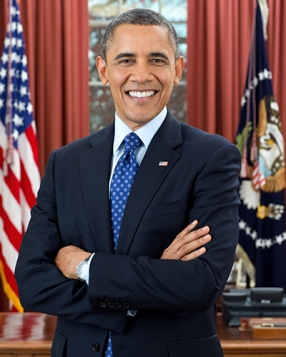
May 29, 2024
West Point, NY: Barack Obama, 44th President of the United States, will receive the 2024 Sylvanus Thayer Award from the West Point Association of Graduates. Obama will be the fifth U.S. president to receive the Thayer Award during its 67-year history. The award will be presented on September 19, 2024, during ceremonies hosted by the U.S. Military Academy at West Point.
WPAOG’s Board Chairman, the Honorable Robert A. McDonald said, “As a two-term president of the United States, Barack Obama’s administration understood what President Lincoln meant in his Second Inaugural Address when he directed the nation to care for those who have ‘borne the battle.’” Obama left office on January 20, 2017, as the first American president to oversee two full terms as a commander-in-chief with combat troops deployed to hostile zones during a time of war. During his time in public service, he fought to make sure that veterans have timely and high-quality access to care, to modernize the claims process, to prevent and end veteran homelessness, and to provide resources so that the nation is serving every veteran. “His life and career have inspired countless Americans, including many cadets past and present,” said McDonald. “Having President Obama forever associated with West Point through its most prestigious award speaks directly to the Thayer Award’s purpose of recognizing a citizen of the United States, other than a West Point graduate, whose outstanding character, accomplishments, and stature draw wholesome comparison to the qualities for which West Point strives, in keeping with its motto: ‘Duty, Honor, Country.’”
“I want to thank the West Point Association of Graduates for this distinguished award,” said President Obama. “I’ve been a longtime supporter of West Point’s mission and have always admired the leaders of character it has produced for our nation.”
“The Thayer Award recipient is selected by the Thayer Award Committee, a 15-member nominating committee that includes representatives from numerous West Point classes spanning several decades and regions, as well as Army representatives. The committee reviews and debates the merits of approximately 25 nominations submitted by West Point Graduates. The WPAOG Board of Directors ratifies the committee’s selection,” stated retired Lieutenant General Guy Swan III and committee Chair.
Obama graduated from Columbia University in 1983 with a B.A. in political science, and in 1988, he enrolled in Harvard Law School Upon graduation, he returned to Illinois to teach constitutional law at the University of Chicago and begin a career in public service, winning seats in the Illinois State Senate and the United States Senate. As a U.S. senator, he served on the United States Senate Committee on Veterans’ Affairs and Committee on Foreign Relations. Obama’s belief in America’s indispensable leadership and strong, principled diplomacy helped him wind down the wars in Iraq and Afghanistan, decimate al Qaeda and eliminate Osama bin Laden and the world’s most wanted terrorists, and shut down Iran’s nuclear weapons program. Obama’s military support and accomplishments include increasing Special Forces teams and technology during the Iraq War, which proved to be a positive forward-thinking strategy for the United States, and introducing strategies and policies that reduced the number of American casualties in the Global War on Terrorism. In 2014, Obama signed the Veterans’ Access to Care through Choice, Accountability, and Transparency Act (aka “VA reform bill”), making more funding available to enable better medical care for veterans. He also initiated and signed a recruitment and employment plan to get more veterans into government jobs (lowering the unemployment rate for veterans by more than half) and signed a bill to expand the availability of housing to homeless veterans.
Speech
Remarks by President Barack Obama
Thayer Award Acceptance
West Point, New York
September 19, 2024
Thank you so much. Thank you. Please, please. Thank you so much. Please be seated. To General Gilland, thank you for the introduction, more importantly thank you for your leadership of one of the world’s finest not only military institutions but institutions period. Don’t tell Navy I said that.
To the leadership, staff, distinguished guests, thank you for being here. To the West Point Association of Graduates – including your Chairman, and one of the best Secretaries of Veterans Affairs this country has ever had, my friend Bob McDonald – thank you for this incredible honor.
I had a chance to look at the list of past recipients of the Thayer Award, and I could not help but feel profoundly humbled. It’s even more humbling to know that this award is bestowed by men and women who represent the very best that this country has to offer.
And I couldn’t be happier to have had the chance to spend time with a group that I know will make their own lasting mark on our nation in the years ahead: the Corps of Cadets. I had the pleasure of visiting with some of you today and saw the rest of you on the Plain – and I think it’s fair to say that you are a whole lot more impressive than I was in college. You are certainly tidier than I was.
Since we’re in the Cadet Mess Hall, you should know it was my intention to give you more than 25 minutes to finish your dinner. But I’m told that’s about all the time you’ll have – which I guess you are used to by now.
On my previous visit to West Point, I was also able to repay some hospitality by absolving all cadets who are on restriction for minor conduct offenses. Unfortunately, it turns out as one of my predecessors pointed out, former presidents can’t do that. But I promise that when I get back to Washington, I’ll put in a good word with the guy who can. I’ve still got a little bit of juice.
So, my powers may be more limited as a private citizen than they were when I was President and Commander-in-Chief. But the one thing I can still do is to express my heartfelt gratitude, and my pride, to every cadet for your commitment to serve the American people. We live in a strange time; and at a time of so much division, you’ve chosen teamwork and unity. At a time of so much cynicism, you’ve chosen faith in our country and faith in the future. And at a time when so much of our culture is constantly steering us towards money and fame and distraction and “likes”, you’ve embarked on a life of purpose – to strive on behalf of something bigger than yourselves. That is worthy of thanks. It fills me with pride.
Of course, the world you inherit is complicated, and it is moving faster than at any time in human history. So, if it’s alright with you, I’d like to spend ten minutes or so sharing a few observations – about America’s place in the world, and the vital role that you will all play in keeping our nation strong and secure.
And I’m gonna start with a point that didn’t used to be in dispute but may be today– America remains the indispensable nation.
It’s become popular in some quarters, both on the left and the right, to question U.S. primacy in world affairs. And it’s true that a host of changes in the international landscape – from globalization to the information revolution, to the rise of China to the reassertion of Russian aggression against its neighbors – these things are testing the international order that the United States helped construct from the end of World War II through the end of the Cold War.
But I can tell you from experience, from sitting in the Oval Office for 8 years, that the world continues, in ways large and small, to depend on American leadership. Our economy remains the strongest and most innovative. Our values continue to inspire people across the globe. And although we must remain ever vigilant, constantly improving readiness and modernizing our forces, no other country comes close to matching the capabilities of our Navy, and our Air Force, and our Marines, and our Coast Guard – and of course, our Army.
Now over the course of 75 years, the post-World War II era, we haven’t always employed this awesome power perfectly. We’ve made our share of mistakes, and there have been instances where we did not fully live up to our ideals. But overall, the international system that we built has helped usher in the most peaceful, prosperous era in human history.
With all the violence and suffering that we see in the news every day, that may sound controversial. It may seem like an exaggeration but it is true. For more than half a century, the absolute number of war deaths around the world has declined. Wars between nations have been increasingly rare. More than 1 billion people have been lifted from extreme poverty in my lifetime, and diseases that once killed and crippled millions have been effectively eradicated.
The United States of America helped to do all that – and we did it not just for our benefit, but for much of the world’s. Even our adversaries benefitted from that architecture that we built; China’s rise depended on it, for example. And that leadership is as vital today as it ever was. It’s the reason why, when there’s a pandemic, or a natural disaster, or a conflict, or a blatant violation of human rights – leaders do not call Beijing or Moscow. They call Washington – because they know we care and they know we can get things done.
I say all this, cadets, not just to pump you up or to wave the flag, I’m saying this to you because your generation is up. You have taken the baton. And it will be up to you to make sure that America does not turn inward – that we do not abandon our leadership role and give in to isolationism.
And that won’t be easy. In these uncertain times, it can be tempting to let other countries fend for themselves – to wash our hands of conflicts and dysfunction and poverty that seem distant and intractable, especially when we have plenty of problems to deal with here at home. It’s one of the few things even today that unifies democrats and republicans, they’re opposed to foreign assistance and doing a lot for folks over there.
But history teaches us, from Pearl Harbor to 9/11, that oceans alone do not insulate us from chaos and disorder and security threats. In a global economy, a financial crisis on the other side of the world can mean layoffs and hardship in the U.S. heartland. Diseases and a changing climate, they don’t recognize borders – and although I believe it’s vital for us to fortify our borders and revamp our immigration laws, there is not a wall that is high enough to prevent people desperate to feed their children from seeking refuge in wealthier countries. So we have a stake in making sure that other places function and prosper and are peaceful.
If we want security and prosperity at home, we have to tend to our responsibilities abroad. That doesn’t mean that we can or should be the world’s policeman. Part of using power wisely means recognizing that we cannot prevent every conflict between countries, or stop every instance of violence or injustice within them. But while American foreign policy needs to be guided by a healthy dose of realism, we have to balance it with a continued willingness to make this world better however and whenever we can – to protect the vulnerable, and stand up for freedom, and aid those in need. Not just because it’s right, but because it is ultimately in America’s interests to do so.
Which brings me to my second point. All of you have committed to putting your lives on the line to defend this nation, and as Commander-in-Chief, I took a solemn oath to do whatever was necessary to protect the American people. In an often dangerous and violent world, that sometimes meant ordering the use of lethal force – and sending young men and women like yourselves into combat. Because whether it’s pirates off the coast of Somalia, or terrorists like bin Laden, or rogue states trying to obtain nuclear weapons, our enemies need to understand that if you target America or its allies, there will be hell to pay.
But while we can never hesitate to do what is necessary to keep this nation safe, and while we should celebrate every day, thank God, the extraordinary courage and resolve of our troops, we should also never forget that war is tragedy. No matter how just, no matter how good our intentions. It always leaves scars, seen and unseen, not only on the vanquished, but on the victors. And no one understands this better than those who actually do the fighting – our veterans, including so many decorated West Point alumni here tonight; or our wounded warriors or our Gold Star families; all of whom deserve our eternal thanks.
And that’s why it is up to policy makers, decision makers, and voters who elect them to meet our solemn responsibility – to you, cadets, and all the other Americans who are willing to fight in our name.
So what are those responsibilities? We should expect our leaders to exhaust other options before rushing into war. We should expect them to be guided by sound intelligence and strategy rather than ideology or the desire to look strong.
We have a responsibility to maintain our alliances – and build, whenever possible, coalitions and partnerships that can share the burden of global security. There are times – like after 9/11 – when we confront a direct and immediate threat and if we have to, we must be prepared to go it alone. But in most instances, the threats we confront don’t solely affect the United States, and we should make sure that we’ve built the institutions, invested in things like NATO, cultivated relationships that provide the opportunity for others to effectively step up and join us.
We have a responsibility to resist the temptation to intervene militarily every time there’s a problem or crisis. History is littered with the ruins of empires and nations that overextended themselves, draining their power and influence. You know, during my eight years in office, one of the things that impressed me most was how often it was my military advisors – the Joint Chiefs, commanding officers, and military personnel detailed to the White House – they were the ones who counseled restraint when it came to using lethal force, which was a welcome contrast to the slew of politicians and talking heads on TV who liked to talk tough from the cheap seats.
We have a responsibility to always give our troops a clear mission, the support they need to get the job done, and a plan for what comes after. And when the U.S. military gets involved in a conflict, we need to do so by making honest assessments of the risks and the tradeoffs. And when things don’t go according to plan, we need to admit our mistakes and reevaluate our strategies rather than just doubling down. That is what we owe the heroes, those who are willing to put themselves in the line of fire. That’s how we prevent the kind of mission creep that history teaches us to avoid. That’s how we keep our nation secure – and justify the trust of our troops.
And when we do use force, we have a responsibility to use it proportionally. In every war, without exception, innocents get caught in the crossfire. And as technology evolves, those deaths can seem increasingly abstract. Except there’s nothing abstract about a dead child or a grieving mother. And I know firsthand sometimes, as decision makers we must bear the weight of such tragic consequences. It’s part of the job. But we should never become numb to such deaths. If we want to continue to lead the world, and rally others to our side, then America should always hold itself to the highest ethical standards when it comes to the use of force, even when our adversaries don’t, and do everything in our power to prevent the loss of innocent life.
Which leads me to my final point: As powerful as our armed forces are, many of the greatest threats to our security will not be solved by military force alone. Our military power is necessary, but it is not sufficient. To meet the challenges of our time, we’ll also need to harness every element of our national power.
And it’s a truth that all the top military leaders who advised me well understood during my presidency. If you want to support our military, then along with a strong defense budget and looking after our veterans, you should also support U.S. programs that help young people in poor countries get an education. If you want to reduce the appeal of violent extremism in distant parts of the world, then you have to care about economic and political reforms that promote growth and allow citizens to choose their own leaders. Diplomacy, foreign aid, cultural exchanges, lifting up universal principles around things like human rights – thoee things matter because they may save us over the long term from having to send our sons and daughters off to fight.
And here’s the thing when it comes to all these elements of American power: maybe none is more important than the example we set here at home.
No nation, no society in human history, has ever tried to build a democracy as big and diverse as ours, ever – one where our allegiances and our community are defined not by race or blood, but by common creed. That’s what I saw on the plane today. That’s what I saw represented by those cadets. And people around the world are watching to see if we can pull it off. That’s why when we live up to our values – when we invest in each other, and find ways to live together, and respect the democratic process – the world gets a little bit brighter. And when we don’t, the world grows little dimmer. And dictators and autocrats feel emboldened, international norms begin to fray, we lose credibility and influence with our allies, and over time we become less safe.
As future leaders, cadets, all of you will have a key role to play in helping us stay true to our ideals and helping us to set that example. I don’t know where all of you are going to end up, but you are going to have influence, and you are going to have power. And it will be up to you to uphold our Constitution and our Bill of Rights, the rule of law and the peaceful transfer of power. It will be up to you to ensure that our military institutions are never politicized, and respect for civilian control of the policymaking process. It will be up to you to set an example for how we can disagree without calling each other names, and demonizing each other, showing us how to treat each other with respect, standing up to those who would divide us along racial or religious lines. That’s going to be the test for your leadership, and like those who came before, you will have a chance to show our friends and our adversaries alike that democracy is not just about the words on our founding documents, or any particular election. It’s about the choices we make and the actions we take, and our fidelity to our ideals, as Americans, every single day.
So, there you have it – a few thoughts from a former Commander-in-Chief who’s getting greyer by the minute about how to keep our military strong and our nation secure.
I realize that no Thayer Award speech is complete without quoting its most famous recipient, or one of them, General Douglas MacArthur. I’m told he gave his acceptance speech from memory – an example I have obviously failed to live up to.
But when General MacArthur spoke of American soldiers in that speech – when he reflected on your “patience under adversity,” your “courage under fire,” and your “modesty in victory,” – he described being, and I quote, “filled with an emotion of admiration I cannot put into words.”
Well, let me just say, I feel the same way. And while we can never know exactly what the future holds, I sleep well at night knowing that men and women like you serve to keep us free.
So thank you again for this tremendous honor. And more importantly, thank you and every member of the Long Gray Line for your service and sacrifice in the name of duty, honor, and country.
May God bless you, and may God bless these United States of America.

